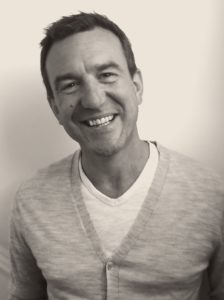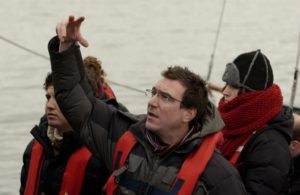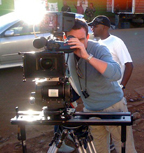Creative Process Series – Part One
In the first of a 5-part series in collaboration with Audio Network, all this week we are exploring the importance of creative process. Speaking to industry experts, we ask for their advice for creating a successful end product. In today’s post, TCC’s Emmy award-winning Director, Dave Ward, talks about his experience in the creative industry. In his section of the Creative Process series, Dave divulges his best tips for success and how to ensure you get the best from your crew.
 I’ve been making a living – on occasion quite a lucrative one – and enjoying a career as a Director for 20 years. Sometimes I have navigated stormy waters, struggling to remember why I chose this ridiculous life, convinced that I’ll never work again or be able to feed my children. I nearly froze to death filming an expedition in the Arctic, almost boiled my blood in the Arabian desert and have seen a seat right behind me ejected from a helicopter whilst shooting high above the Nigerian Delta.
I’ve been making a living – on occasion quite a lucrative one – and enjoying a career as a Director for 20 years. Sometimes I have navigated stormy waters, struggling to remember why I chose this ridiculous life, convinced that I’ll never work again or be able to feed my children. I nearly froze to death filming an expedition in the Arctic, almost boiled my blood in the Arabian desert and have seen a seat right behind me ejected from a helicopter whilst shooting high above the Nigerian Delta.
Having said that, riding the tides high and low doesn’t stop me from loving what I do.
I count myself as one of an increasingly lucky (and diminishing) band of jobbing directors who cut their teeth shooting on film: 16mm at film school – first on a wind-up, fixed-lens Bolex, all the way up to shooting commercials and films on Super 35mm with every gizmo you’ve ever heard of and a few you probably haven’t.
Whilst I confess a certain nostalgic pang for the aesthetics of celluloid, this period of my career meant much more than the extraordinary depth of images that film provided and the many hours in the magic netherworld of tele-cine. It taught me the discipline of meticulous planning, thorough rehearsals and continuous communication between all departments.
With that in mind, here are my top 3 “hopefully-helpful-hints” for anyone tempted to navigate the uncertain waters of directing for the camera.
- PLAN EVERYTHING – Time goes faster on a film set
Of course scientifically this is nonsense. But it sure feels that way. When (and I guarantee this WILL happen) your time slips away because your talent is still in the makeup chair/ the crew are focusing on what’s for lunch rather than your grand vision/ it took over an hour to put up three lamps, your time will run out.
To avoid this inevitable panic, PLAN EVERYTHING. I can’t stress the need to break your scenes down into shots, and turn these shots into a schedule:
– How long do you think each shot will take to prep, light and convince your DOP that he/she can’t have another half-hour?
– How long will it take to move, prep and set the camera, change lenses, spot the monitor(s), measure the focus, rehearse the camera move and rehearse the scene technically?
– How long to block the scene, rehearse the action, discuss performances with the talent and re-rehearse?
– How much time needs to be allocated to deal with technical problems, do make-up checks and check continuity against various stills from previous scenes?
Whatever time you have estimated, double it. That might be close to how long it will take.
Planning realistically is key to making the film you envision on schedule and within budget.

- Kill your darlings.
This is one of the most difficult and most important rules I’ve learnt.
When you’re in the edit suite watching the rushes of that precious, long-planned shot that took forever to devise and achieve, be prepared to cut the shot.
Yes, it may have cost time, sweat, problem-solving, belligerent co-operation, blagging, patience and hard cash to pull off. But only you know this; try to see the film from the audience’s perspective, and not your own. Ditch that beautiful, impossibly-hard-to-get-and-I-really-love-it showstopper of a shot.
It is painfully difficult but when a simple wide-shot on a tripod serves the story and film better, it’s a pill you better be prepared to swallow for the sake of the film.
- Journeys are as important as destinations…and ships need Captains and crews.
If I’ve learnt anything, this is probably the most valuable lesson to me and one I try to take to each and every project.
Nobody respects a fool, and nobody likes an egomaniac.
When I was at film school, I paid my way by making ‘behind-the-scenes’ films of big commercials and I remember being on set with a very well-known A-list actor and a very frustrated young director. He was screaming out loud: “The problem is I don’t know what I want!”
 Right there and then, I promised myself that would never be me.
Right there and then, I promised myself that would never be me.
Directing is essentially about ensuring you are steering the ship, that the crew all know where you are heading and your plan for getting there. It is also about ensuring they are with you for the duration. A crew should always be respected and treated as valued and indispensable members of the same team; it’s called a ‘crew’ for good reason.
Finally, always remember that this was never going to be easy; if you put yourself forward as the captain of this cinematic ship then the least you can do is get safely to your destination without anyone (you included) falling overboard.
Remember, it’s a choice. Not everyone is cut out to be a director.
Famously, the celebrated and brilliant 1st Assistant Director David Tomblin was asked by Sir Richard Attenborough to instruct the crowd of some 300,000 extras assembled for the funeral scene in Ghandi. “I want you to convey to them, David, that Gandhi has died…” explained the exhausted director. “It’s an extraordinary event, darling, the most extraordinary event in the whole history of India! Gandhi is gone! Their god, their national hero is gone!”
David Tomblin turned to the crowd and through the numerous loudspeakers assembled around the location, his immortal words echoed: “Right, listen up! Gandhi’s dead and you’re all effing sad!”
As I said, not everyone is cut out to be a director.
Navigating these seas is always eventful. So bon voyage.
To view Dave Ward’s showreel, head to our showreel gallery.
This series will continue every day this week; tomorrow we hear from Audio Network’s Composer, Martin Felix Kaczmarski.

Audio Network is an independent music company delivering authentic and creative music solutions to global content creators in every industry. Their production music library has over 120,500 high quality stock music tracks for TV, film, advertising and corporate video.

